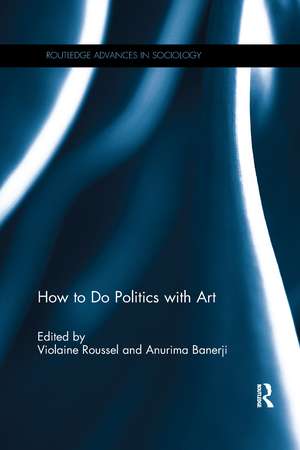How To Do Politics With Art
Editat de Violaine Roussel, Anurima Banerjien Limba Engleză Paperback – 30 iun 2020
Recent work has begun to broaden the study of the arts and politics beyond semiosis and content focus. Several strands of scholarship are converging around the general issue of the social relationships within which art takes political form, that is, how art and artists do politics. This perspective of "doing" moves analysis beyond addressing the meaning of culture, to focus on the ways that art is embedded in—and intervenes in—social relationships, activities, and institutions.
This volume brings together an interdisciplinary group of scholars from France and the United States to investigate these directions and themes by exploring the question of "how to do politics with art" from a comparative standpoint, putting sociological approaches in conversation with other disciplinary prisms. It will be of interest to scholars of social movements and politicization, the sociology of art, art history, and aesthetics.
| Toate formatele și edițiile | Preț | Express |
|---|---|---|
| Paperback (1) | 259.98 lei 6-8 săpt. | |
| Taylor & Francis – 30 iun 2020 | 259.98 lei 6-8 săpt. | |
| Hardback (1) | 1054.71 lei 6-8 săpt. | |
| Taylor & Francis – 4 noi 2016 | 1054.71 lei 6-8 săpt. |
Preț: 259.98 lei
Preț vechi: 311.41 lei
-17% Nou
Puncte Express: 390
Preț estimativ în valută:
49.77€ • 51.93$ • 41.72£
49.77€ • 51.93$ • 41.72£
Carte tipărită la comandă
Livrare economică 13-27 martie
Preluare comenzi: 021 569.72.76
Specificații
ISBN-13: 9780367595791
ISBN-10: 0367595796
Pagini: 238
Dimensiuni: 156 x 234 mm
Greutate: 0.45 kg
Ediția:1
Editura: Taylor & Francis
Colecția Routledge
Locul publicării:Oxford, United Kingdom
ISBN-10: 0367595796
Pagini: 238
Dimensiuni: 156 x 234 mm
Greutate: 0.45 kg
Ediția:1
Editura: Taylor & Francis
Colecția Routledge
Locul publicării:Oxford, United Kingdom
Cuprins
Introduction (Violaine Roussel and Anurima Banerji)
1. Composing Workers (William Roy)
2. ‘Singing for a Cause’: Music and Political Mobilizations in Contemporary France (Lilian Mathieu)
3. How Activist Plays Do Politics (Bleuwenn Lechaux)
4. Nrityagram: Tradition and the Aesthetics of Transgression (Anurima Banerji)
5. ‘Social Cinema’ & ‘Civic Debates:’ The Politicization of Films through Festivals in France (Audrey Mariette)
6. Movie-Star Politics On and Off the Screen: Harry Belafonte, Jane Fonda, and Warren Beatty (Steven Ross)
7. How Hollywood Agents Do Politics (Violaine Roussel)
Afterword, A Filmmaker’s Perspective: On Ways of Viewing: Notes on the Making of Kamakha, Through Prayerful Eyes (Aparna Sharma)
1. Composing Workers (William Roy)
2. ‘Singing for a Cause’: Music and Political Mobilizations in Contemporary France (Lilian Mathieu)
3. How Activist Plays Do Politics (Bleuwenn Lechaux)
4. Nrityagram: Tradition and the Aesthetics of Transgression (Anurima Banerji)
5. ‘Social Cinema’ & ‘Civic Debates:’ The Politicization of Films through Festivals in France (Audrey Mariette)
6. Movie-Star Politics On and Off the Screen: Harry Belafonte, Jane Fonda, and Warren Beatty (Steven Ross)
7. How Hollywood Agents Do Politics (Violaine Roussel)
Afterword, A Filmmaker’s Perspective: On Ways of Viewing: Notes on the Making of Kamakha, Through Prayerful Eyes (Aparna Sharma)
Notă biografică
Violaine Roussel is Professor of Sociology at the University of Paris 8, France, and Affiliated Faculty at the University of Southern California, USA.
Anurima Banerji is Assistant Professor of World Arts and Cultures/Dance at the University of California, Los Angeles, USA.
Recenzii
'Artists of all stripes have been "doing" politics for a long time. Yet, there have been relatively few systematic interdisciplinary and cross national studies of this process. Banerji and Roussel provide us with an anthology that addresses this subject from multiple vantage points. This volume is certain to become a landmark text that moves the discussion forward in new and exciting ways.' - Mabel Berezin, Cornell University, U.S.A
'The arts take a step away from daily life only to step back in and imbue life with aesthetic charge. This book enriches our understanding of that process, asking how the arts afford and nurture forms of political action.' - Tia DeNora, Exeter University, UK
'The arts take a step away from daily life only to step back in and imbue life with aesthetic charge. This book enriches our understanding of that process, asking how the arts afford and nurture forms of political action.' - Tia DeNora, Exeter University, UK
Descriere
This volume brings together an interdisciplinary group of scholars from France and the United States to investigate these directions and themes by exploring the question of "how to do politics with art" from a comparative standpoint, putting sociological approaches in conversation with other disciplinary prisms. It will be of interest to scholar
